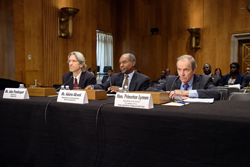
Editor’s Note: This blog post was written by Enough Project Intern Amanda Schmitt.
On December 10, 2015, Enough Project Founding Director John Prendergast testified before the U.S. Senate Foreign Relations Committee, assembling for a session on “Independent South Sudan: A Failure of Leadership.” Expert witnesses included Ambassador Donald Booth, Special Envoy to Sudan and South Sudan; Bob Leavitt, Deputy Assistant Administrator in USAID’s Bureau for Democracy, Conflict, and Humanitarian Assistance; Ambassador Princeton Lyman, Senior Advisor to the President at the US Institute of Peace and Former Special Envoy to Sudan and South Sudan; and Adotei Akwei, Managing Director of Government Relations at Amnesty International USA. Chairman Corker (R-TN) presided over the hearing, with Ranking Member Cardin (D-MD), Senator Gardner (R-CO), and Senator Kaine (D-VA) in attendance as well.
Focusing on an often overlooked yet intrinsic dynamic of conflict, Prendergast asserted that the international community is neglecting the issue of South Sudan’s violent kleptocracy. He stated that South Sudan and similarly corrupt states are “not simply failed states… they are actually hijacked states” in which leaders’ agendas are “aimed primarily at self enrichment and [stopping] dissent.” Prendergast implored the Foreign Relations Committee to look into avenues of financial and economic leverage as an arena “where the SFRC can make the biggest difference.” He suggested a more robust enforcement of the sanctions regime, incorporating a wider group of perpetrators and financial institutions, as well as support for the Global Magnitsky Human Rights Accountability Act (S. 284), prohibiting corrupt officials or human rights abusers from use of US financial institutions or entry into the US. He also described a new Enough Project initiative, the Sentry, that aims to privately fill the gap of tracing illicit financial transactions and networks that support such regimes.
The government panel offered a broad description of the conflict and US efforts, while the second panel of non-governmental witnesses each approached the conflict from different angles. Lyman focused on the technical aspects of the agreement and proposed actions; Prendergast detailed the complexities of corruption and financial approaches to addressing the conflict; and Akwei highlighted the dire humanitarian circumstances and restricted civil society space.
Lyman emphasized an added level of potential volatility and danger to the August 2015 peace agreement’s implementation, since the agreement “relies heavily on the two people who are leading the war.” To counter this vulnerability, Lyman suggested that the recently appointed chair of the Joint Monitoring and Evaluation Commission (JMEC)—Festus Mogae, the former President of Botswana—“should have the power of a high commissioner” and be able to veto government appointments through the transition. He additionally proposed that the head of the hybrid court be appointed now and work closely with Mogae to ensure that justice and accountability are upheld throughout the peace process.
From a humanitarian and justice lens, Akwei expressed his concern for the dangerous government closure of political space with the shutting down of numerous media outlets and the harassment and detainment of civil society members. He also described the danger around the prospective passing of the National Security Bill in South Sudan, which would give the National Security Service power to arrest with little oversight or accountability. Akwei proposed a comprehensive arms embargo, asset freezes, travel bans, and support for reconciliation initiatives. He suggested the need for US government evidence-gathering to bolster any future financial or human rights investigations.
Chairman Corker specifically asked Leavitt about the targeting of aid workers, to which he responded that the government “rhetoric has not been positive.” Leavitt added that the workers are being targeted by both sides, conceding that the South Sudan government or proxies are propagating such attacks. Lyman later detailed that 41 aid workers have been killed. Special Envoy Booth described the lessened level of control or specific direction between the government and proxy forces, explaining the proxies’ actions as “retail freelancing” rather than the implementation of an official directive.
In reaction to the danger for humanitarian workers, Senator Corker frankly stated to South Sudan’s embassy representatives in attendance, “I don’t know how representatives from South Sudan can show up to a hearing like this and not be totally embarrassed.” To address this threat to aid workers’ safety, Lyman suggested that when the UN votes to renew the UN Mission in South Sudan (UNMISS) (which they later did on December 15), that they should reaffirm that attacks on UN peacekeepers are war crimes and that perpetrators will be held accountable; he additionally advocated that same precedent should apply to aid workers.
A number of Senators asked what a suggested Plan B would be if the agreement were to fail, to which witnesses suggested raising the process to a higher level with a meeting of relevant heads of state at the UN, an arms embargo, and a trade embargo with exceptions of food and medicine. Panelists also highlighted the need for commitment for enforcement of such restrictions by neighboring states. In response to concern over premature dismissal of the current process, Senator Cardin stated, “I don’t want to undermine the peace process, but I will not [tolerate] the status quo.”
Panelists suggested pursuing some of the steps of the proposed Plan B, particularly financial pressures, while concurrently pursuing peace by way of the agreement, hoping that the dual pressure will reinforce the process. Chairman Corker concluded by acknowledging the hearing’s effective discussion, stating, “my expectation is that there will be action taken as a result of this hearing.”
- Watch the full hearing here.
- Read Enough Project Director John Prendergast’s testimony here.
- If you are interested in learning more about South Sudan, read the newly released Enough Project report, “Deadly Enterprise: Dismantling South Sudan's War Economy and Countering Potential Spoilers.”

